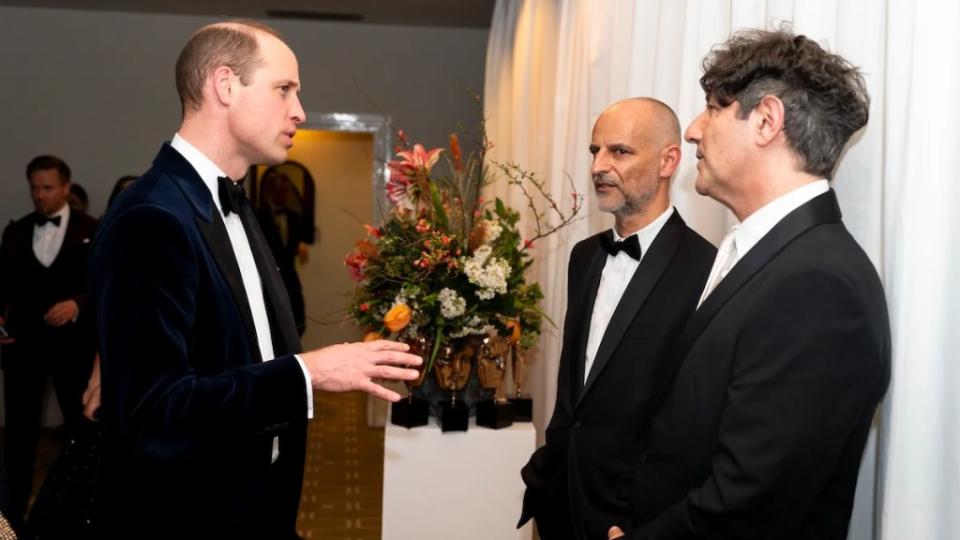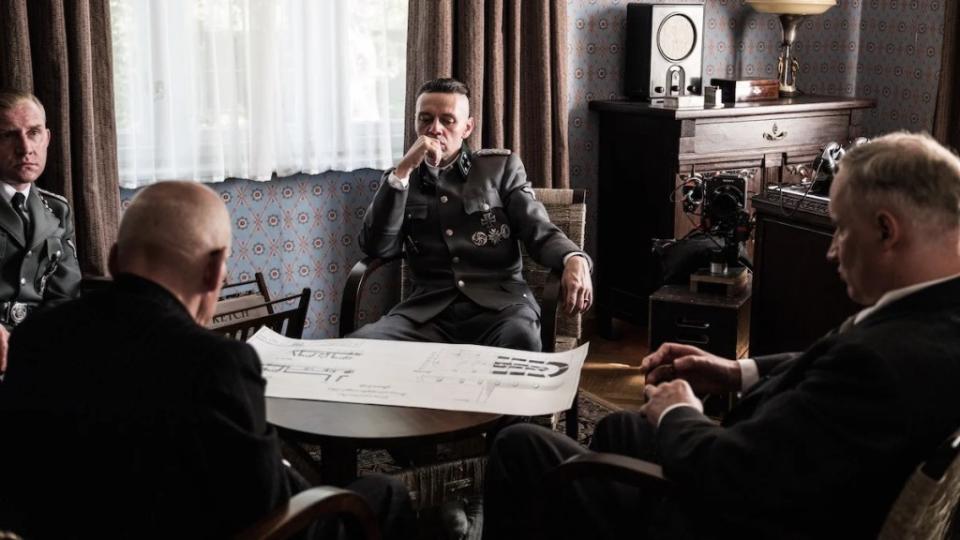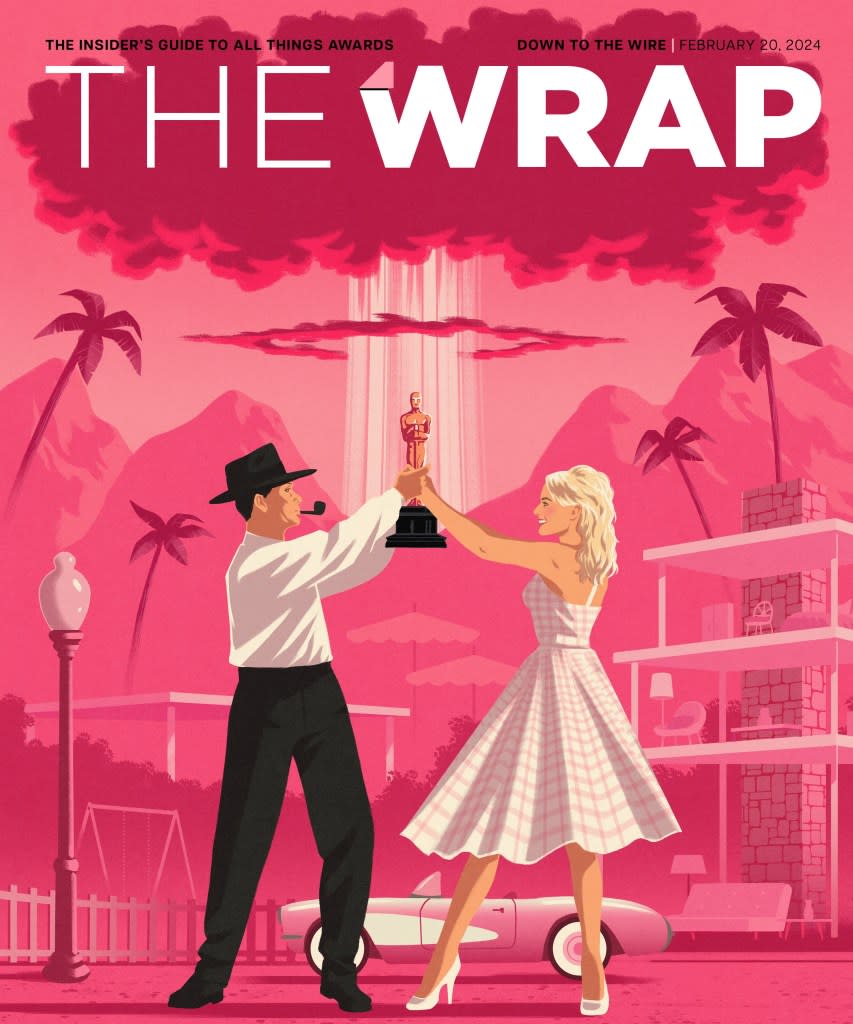‘Zone of Interest’ Producer Says Filming at Auschwitz Took a Toll
Jonathan Glazer’s “The Zone of Interest,” only the fourth film in the 24-year feature career of the British director of “Sexy Beast,” “Birth” and “Under the Skin,” is in some ways the unlikeliest of this year’s 10 Best Picture nominees. A purposefully dispassionate chronicle of a subject — the Holocaust — unusually approached with enormous passion, it follows the daily life of a German family that lives in Poland during World War II.
The father, Rudolph Höss, is the commandant of the Auschwitz concentration camp, which sits just over their garden and from which screams, shouts and smoke occasionally disturb the lives of Rudolph (Christian Friedel), his wife Hedwig (Sandra Hüller) and their children. (The film was shot not in the real Höss house, which still exists and is privately owned, but in a different house just outside the walls of Auschwitz.)
The camera never goes over the wall and into the camp, and the film takes place without a single closeup, as if the camera itself doesn’t want to get too close to these people. Though the film takes its title from Martin Amis’ 2014 novel of the same name and is ostensibly based on that book, it jettisons Amis’ plot to tell a simple story in a way that is both rigorous and chilling.
Since its premiere at the Cannes Film Festival, where it won the Grand Prix — essentially, the runner-up prize to the Palme d’Or won by “Anatomy of a Fall” — the movie has caught the attention of voters. It received five Oscar nominations, for Best Picture, Best Director, Best Adapted Screenplay, Best International Feature Film and Best Sound, and it won BAFTA Awards for Best British Film and Best Film Not in the English Language.
For most of awards season, though, Glazer himself has been largely absent from the awards circuit.“He’s not super relaxed or comfortable being what he calls ‘in front of the film,’” his producer, James Wilson, told TheWrap.

I would think that when you’re making a movie this uncompromising, the last thing you’re thinking about is, “How is this going to appeal to awards voters?”
That is probably the easiest “yes, you’re right” of any question I have been asked since the launch of “The Zone of Interest” in Cannes in May. Yes, you’re absolutely right. It’s not really a traditional narrative. It refutes narrative form — it hasn’t really got a story in the traditional sense. It’s sort of the film of an idea. To be recognized by the Academy, I’m still scratching my head every so often because our thoughts couldn’t have been further from that. And in terms of the long, nine-year journey of making the film and where one thought it might have sat in the ecosystem, we were absolutely shocked.
What was that long journey like? The film is so rigorous in many ways, and that has to be something that developed slowly over a period of time.
Yes, you’re right about that rigor. It’s a very restrained film, especially for what you might think of for Jonathan Glazer. He’s a strikingly visual director. And I don’t think it isn’t strikingly visual, if you think about the thermal imagery in it and certain other parts of it. But it’s a restrained film and it is rigorous, and there’s a certain kind of austerity to it. And that form didn’t just emerge. It was a quite organic journey.
There were consistent things about the philosophical vision of the film and the questions it was asking. That included the perpetrator perspective. The Amis novel was the jumping-off point, the spark for Jon, back in 2014. He and I had been talking and thinking about the subject matter — the subject matter being National Socialism, Nazism, that moment. A Nazi concentration camp from the point of view of the people who run it, shown from a largely domestic and private perspective.
That felt like a frame that would ask some really interesting questions about complicity and compartmentalization and indifference, all sorts of things. But the form of what that would be did take a while to develop. Jon was writing the script for about five or six years, and it was very research-based.
The book is a novel set in a fictional concentration camp with fictional characters, and the commandant’s wife is having an affair with a high-ranking executive, and Auschwitz is the backdrop for that. Jon very swiftly decided that he didn’t want to do that. He didn’t want there to be any story that Auschwitz was the backdrop of, and we very quickly realized that the novel is based on Rudolph Höss and his family. As soon as Jon found out about the Höss family and visited Auschwitz, we saw the real house. And we saw that real proximity, which is completely mimicked in the film, of how the camp is literally on the other side of their garden wall.
It was almost like a light bulb of, “OK, that’s what I want to do. I want to do the Höss family, Rudolph and Hedwig and that life that they lived.” And the book at that point was put in a drawer and never returned to. Then it was this process of gathering information and discussing philosophy, history, all sorts of stuff. He had ideas that were much more expressionistic and heightened. If we unpacked them, you would think it was the opposite of the movie we made, very theatrical and stagey. But that is Jon. Working with Jon, everything is always alive and open.
So although it became something not expressionistic in terms of the main body of the film, there were other sequences that were different. For example, the sequence of the Polish girl who leaves fruit for prisoners. It was based on a real girl who he met, and he said, “I want that in the film.” But she did it at night, and he had this rule about no movie lights. So what’s the tool for that? We found this thermal-imaging camera that has this extraordinary, strange and expressive quality. In funny ways, all of these different film languages are in there. But it was a very, very changeable process to find it.

Obviously, it’s a key decision to have the camera stay on the outside of the wall at Auschwitz — to say, “You’re going to hear what’s on the other side of the wall, but we’re not going to take you there.” What was the thinking that went into that decision?
We always wanted the majority of the film to take place in the domestic world. That idea was an early epiphany. The first time we went to Auschwitz, I think in 2015 or ’16, we saw that the Höss house is still there. It’s a private home, it’s not part of the museum. And the wall is still the iconic, concrete wall with barbed wire holders. That house and garden were really key, because they were so strong.
But yes, in the earlier draft of the script, you did go over the wall and there were sequences and scenes in the camp. There was also a sequence where Höss went to a meeting at the IG Farben factory, which was one of the largest factories in the world. That’s why Auschwitz was built at that site, because it was conceived in tandem by the SS and Farben, which was a civilian chemical company. They planned to build this huge factory, and they wanted free slave labor from the camp. And we wanted to have a scene there because we wanted to talk about the link between economics and the Nazis in a less familiar way than the Holocaust is normally narrated.
We had a draft where there was much more stuff, but there were financial constraints, and we couldn’t really do it. And then it was like, “OK, let’s not go over the wall. This is our world, this is our stage. Those other things we wanted to do, let’s bring them into the house and the garden.” A neat example of that would be the big meeting at IG Farber, which became a meeting in the house with the oven engineers from Topf and Sons, which is the real engineering company in Germany that built the crematoriums.
The image of Höss’ boots being washed and a rivulet of blood running out is similarly a sort of haiku of a sequence. Jon did write a scene where you went over the wall and saw the aftermath of death and murder. And he was like, “No, I don’t want to do that.” It became a principle not to do that.
Did it take a toll on you to be at Auschwitz making this movie?
It took a toll. It was, without doubt, the most challenging film I’ve ever produced. I can’t speak for everyone, but I would imagine that it was for most of us who made it. One part of that was being in that place that has a great gravitas to it. I think everyone responded to it in different ways. For Jon, it was deeply so, and I could see that on him.
We worked with a brilliant script advisor, a German called Franz Rodenkirchen. And when we were working on the development, he said once, “Perhaps what the film is asking is not ‘How could these ordinary people do such terrible things?’” — which is the “banality of evil”-type idea — “but ‘How much like them are we?’”
When he said that, it felt like a key. You can hold onto that as a question. And knowing that that was the question, you can understand that the film stands against an idea of Holocaust exceptionalism that says the Holocaust is a mythical event that’s outside of history and outside of human understanding and can’t be represented. Ultimately, although I understand where those impulses come from, I think it is a a conservative view, because you refute analysis and history if you’re saying, “Well, this just happened because there are monsters.”
In a long-winded way, I think that the film is trying to suggest that it’s not a mythical place. There isn’t a mythical evil in Auschwitz. The Holocaust didn’t just happen in Auschwitz. The Holocaust happened in all sorts of places. It happened there, it happened in Germany, it happened in France, it happened in Amsterdam, it happened in all sorts of places.
And the impulses and the desires and the drives and the fears that are being marshaled — the scapegoating of people so that they can be dehumanized and disposed of or enslaved — are universal ones. All of our histories are marked by it.
I hope that doesn’t sound grandiose or pretentious, but I think you have to resist that comfortable demonization of Auschwitz, because we should be thinking about everything.
This story first appeared in the Down to the Wire issue of TheWrap’s awards magazine. Read more of the issue here.
The post ‘Zone of Interest’ Producer Says Filming at Auschwitz Took a Toll appeared first on TheWrap.



